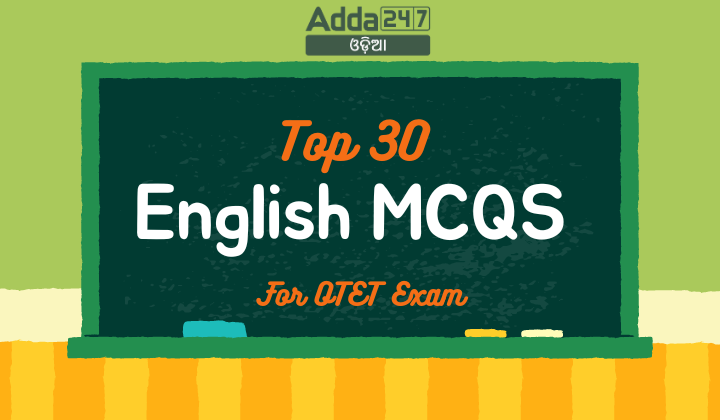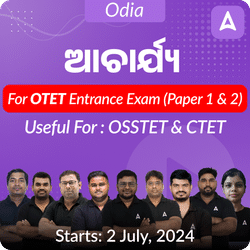Preparing for the OTET exam requires a strong foundation in English grammar and comprehension. Our curated list of the top 30 English Multiple Choice Questions (MCQs) covers key areas such as idioms and phrases, synonyms and antonyms, parts of speech, verb tenses, and correct verb forms. These questions are designed to test and enhance your understanding of essential concepts, ensuring you are well-equipped for the exam. Each question is carefully selected to reflect the types of questions likely to appear on the test, providing a valuable tool for effective exam preparation.
Top 30 English MCQS For OTET Exam
- What does the idiom “to break the ice” mean?
(a) To shatter something
(b) To initiate a conversation
(c) To become angry
(d) To freeze water
Ans: (b) To initiate a conversation - What is meant by the idiom “burn the midnight oil”?
(a) To work late into the night
(b) To waste fuel
(c) To light a candle
(d) To sleep early
Ans: (a) To work late into the night - Select the synonym of “elated”:
(a) Sad
(b) Thrilled
(c) Bored
(d) Tired
Ans: (b) Thrilled - Choose the antonym of “benevolent”:
(a) Generous
(b) Kind
(c) Malevolent
(d) Helpful
Ans: (c) Malevolent - Find the synonym of “candid”:
(a) Secretive
(b) Honest
(c) Evasive
(d) Tactful
Ans: (b) Honest - What is the antonym of “obscure”?
(a) Clear
(b) Hidden
(c) Ambiguous
(d) Unknown
Ans: (a) Clear - Identify the part of speech for the word “quickly” in the sentence: “She ran quickly to the store.”
(a) Noun
(b) Verb
(c) Adverb
(d) Adjective
Ans: (c) Adverb - What is the part of speech for the word “happiness” in the sentence: “Happiness is the key to success.”
(a) Verb
(b) Adjective
(c) Noun
(d) Adverb
Ans: (c) Noun - Choose the part of speech for the word “blue” in the sentence: “She wore a blue dress.”
(a) Noun
(b) Verb
(c) Adjective
(d) Adverb
Ans: (c) Adjective - Identify the part of speech for the word “under” in the sentence: “The cat is under the table.”
(a) Noun
(b) Preposition
(c) Verb
(d) Adjective
Ans: (b) Preposition - Fill in the Blanks on Verb Correct Form
She ________ (to write) a letter when the phone rang.
(a) Writes
(b) Was writing
(c) Wrote
(d) Writing
Ans: (b) Was writing - They __________ (to go) to the park every Sunday.
(a) Goes
(b) Gone
(c) Go
(d) Going
Ans: (c) Go - By the time we arrived, the train __________ (to leave).
(a) Leaves
(b) Leaving
(c) Left
(d) Had left
Ans: (d) Had left - He __________ (to speak) English fluently.
(a) Speak
(b) Speaking
(c) Speaks
(d) Spoken
Ans: (c) Speaks - Choose the correct tense: “She _________ (to finish) her homework by 8 PM.”(a) Finishes
(b) Finished
(c) Will finish
(d) Has finished
Ans: (c) Will finish - Identify the tense: “They __________ (to play) when it started to rain.”
(a) Play
(b) Were playing
(c) Played
(d) Have played
Ans: (b) Were playing - What is the tense of “He __________ (to eat) lunch at noon every day”?
(a) Eats
(b) Ate
(c) Eating
(d) Eat
Ans: (a) Eats - Which tense is used in: “By next week, she __________ (to complete) the project.”
(a) Will have completed
(b) Completes
(c) Completing
(d) Completed
Ans: (a) Will have completed - Choose the correct preposition for the sentence: “The book is ___ the shelf.”
(a) Under
(b) On
(c) In
(d) Over
Ans: (b) On - Which of the following sentences uses a noun correctly?
(a) She ran fastly.
(b) The cat is under the table.
(c) He danced good.
(d) They quickly finished their work.
Ans: (b) The cat is under the table. - What is the correct preposition for the sentence: “She is good ___ mathematics.”
(a) At
(b) On
(c) With
(d) In
Ans: (a) At - Choose the correct adjective for the sentence: “She wore a _____ dress.”
(a) Greenly
(b) Green
(c) Greening
(d) Greenish
Ans: (b) Green - A key aspect of assessing speaking proficiency is:
(a) Accuracy of written grammar
(b) Fluency and clarity in spoken language
(c) Ability to read silently
(d) Memorization of texts
Ans: (b) Fluency and clarity in spoken language - Teaching composition primarily helps students:
(a) Copy text accurately
(b) Express ideas in written form
(c) Memorize grammar rules
(d) Read aloud effectively
Ans: (b) Express ideas in written form - A strategy for teaching reading is:
(a) Using complex scientific texts
(b) Phonic approach
(c) Ignoring punctuation
(d) Focusing solely on translations
Ans: (b) Phonic approach - A technique for developing listening skills is:
(a) Dictation
(b) Silent reading
(c) Story telling
(d) Writing essays
Ans: (c) Story telling - To enhance speaking skills, one should engage in:
(a) Extensive silent reading
(b) Dialogue practice
(c) Listening to audiobooks
(d) Watching silent films
Ans: (b) Dialogue practice - What is a challenge of teaching language in a diverse classroom?
(a) Homogeneous language skills
(b) Different levels of language exposure
(c) Consistent prior knowledge
(d) Identical learning styles
Ans: (b) Different levels of language exposure - In a diverse classroom, teachers must be:
(a) Strict and unyielding
(b) Flexible and adaptive
(c) Focused only on advanced students
(d) Ignorant of individual needs
Ans: (b) Flexible and adaptive - The four basic skills of learning English are:
(a) Listening, speaking, reading, writing
(b) Listening, translating, interpreting, writing
(c) Speaking, translating, reading, interpreting
(d) Writing, listening, translating, reading
Ans: (a) Listening, speaking, reading, writing - What is a key objective of learning English at the elementary level?
(a) To translate ancient texts
(b) To develop basic communication skills
(c) To learn complex grammar rules
(d) To write poetry
Ans: (b) To develop basic communication skills











